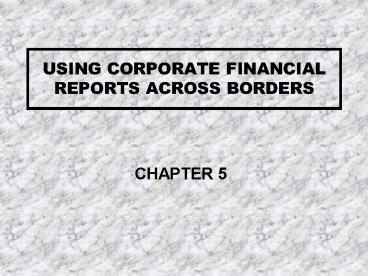USING CORPORATE FINANCIAL REPORTS ACROSS BORDERS - PowerPoint PPT Presentation
1 / 11
Title:
USING CORPORATE FINANCIAL REPORTS ACROSS BORDERS
Description:
difficulties concerning reporting and analyzing financial data. CORPORATE RESPONSES TO FINANCIAL STATEMENT USERS ... Pension and Other Post-Employment. Benefits. ... – PowerPoint PPT presentation
Number of Views:77
Avg rating:3.0/5.0
Title: USING CORPORATE FINANCIAL REPORTS ACROSS BORDERS
1
USING CORPORATE FINANCIAL REPORTS ACROSS BORDERS
- CHAPTER 5
2
This chapter examines and discussesa) corporate
responses to Financial Statement users, in
regards to differences in financial reporting
among countries, b) surveying usersreaction to
corporate efforts and c) finally it looks into
additionaldifficulties concerning reporting and
analyzing financial data.
3
CORPORATE RESPONSES TO FINANCIAL STATEMENT USERS
- From study conducted of both preparer and user of
financial statements it appears that the
nationality of the companies influence to what
extent they were affected by international
accounting diversity. Here some of the preparers
reasons - 1- No need for foreign capital.
- 2- Their main users are domestic users.
- 3- No perceived benefits of doing any extra work
- for these users.
- 4- Reporting consolidated financial statements
and - the work involved.
4
CORPORATE RESPONSES TO FINANCIAL STATEMENT USERS
- 5- Provide more segment information.
- 6- Provide additional explanations and
- information such as, restatements, that
- would take various forms, the effect on
- their profitability and competitiveness
- (i.e. Goodwill amortization).
- 7- Many non-U.S. regulators accept U.S.
- GAAP.
- For these reasons and causes prepare companies
could be divided into the following categories
5
CORPORATE RESPONSES TO FINANCIAL STATEMENT USERS
- DO NOTHING to aid the foreign users to
- understand their financial statements.
- PROVIDE CONVENIENCE TRANSLATIONS
- to aid the foreign users understand their
- financial statements. The Convenience
- Translation would be prepared in the
- foreign user language and currency. BUT it
- would be based on the Home- Country
- accounting principles.
6
- PROVIDE CONVENIENCE TRANSLATION
- Drawback of this approach that the unaware users
could make serious faulty decisions. - LIMITED RESTATEMENT to the foreign
- users language accompanied with
- supplementary information to assist in
- reconciling these statements to the users
- GAAP (accounting standards.)
7
- LIMITED RESTATEMENT
- Limited restatement (or secondary
- statement) could be Country-Specific or
- Universal secondary statement.
- These efforts are directed to serve the foreign
users interest and/or in repose to regulatory
agencies. In addition, we should be mindful of
the cost involved in preparing such statement to
those non-conglomerate organizations.
8
FINANCIAL STATEMENTS ANALYSIS
- A different study conducted by Morgan Stanly
they identified several areas that need the most
attention and understanding in financial
statements analysis, these areas are - Deprecation and Revaluation of Long-
- Term Assets.
- Depreciation period (useful life of assets) and
leased assets should be capitalized. - Goodwill
9
FINANCIAL STATEMENTS ANALYSIS
- Foreign Exchange.
- Difference in translation used could have a
significant effect on reported earnings. - Pension and Other Post-Employment
- Benefits.
- These employees benefits vary significantly from
country to country. These benefits represent
future obligations (liabilities) and any net
interest of pension obligation should be treated
as financial cost and not as interest
expense.
10
FINANCIAL STATEMENTS ANALYSIS
- Consolidation and Group reporting.
- Accounting practices in reporting consolidated
financial statements and whether this
consolidation applies to Equity or Net Income.
Also, the needed assurance that companies are
consistent in applying these accounting
practices. - Taxation.
- Dual reporting regimes verses single reporting
regimes.
11
OTHER ISSUES FINANCIAL STATEMENTS ANALYSIS
- These issues are
- Availability of data.
- Reliability of data.
- Timeliness of data.
- Language, Terminology, and Format.
- Exhibit 5-8, compares the differences in
definitions of one line-item on the Balance
Sheet. - This exhibit is very telling, imagine if these
differences applies to the majority of Balance
Sheet and Income Statement components.































